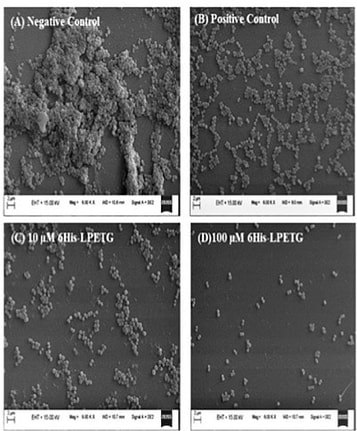Increasing the longevity of indwelling medical implants and preventing Hospital acquired infections11/21/2020  A synthetic peptide (bioconjugate) substrate for cell surface enzyme Sortase A exhibits significant anti-biofilm activity, which can be utilized to make anti-biofilm surfaces for clinical applications and indwelling medical devices. The study conducted by a group of researchers from NIPER Guwahati(National Institute of Pharmaceutical Education and Research, Guwahati), demonstrated that a Sortase-A mediated bioconjugate can inhibit biofilm formation and combat hospital acquired infections, the findings of the study was published in the journal Frontiers in Microbiology. Staphylococcus aureus one of the most notorious pathogens which is frequently associated with nosocomial infections imposing serious risk to immune-compromised patients, because of its ability to colonize at the surface of indwelling medical devices such as catheters, pacemakers, contact lenses, and dentures by biofilm formation. Staphylococcus aureus is known to form multilayered adherent biofilm to the surface of indwelling medical devices including catheters and medical implants, expressing series of toxins which makes them tolerant toward host defense mechanisms and common antibiotics and Biofilm formation on both natural and artificial surfaces is one of the most important virulence mechanisms of many bacterial pathogens, as it guards the bacteria against antibiotic therapy, and thus considered to be the major cause of nosocomial infections especially in post-surgical and immune-compromised patients and is associated with significant mortality in hospitalized patients. Sortase A is one of the most important enzymes present on the cell surface of Gram positive bacteria including S. aureus. Sortase A recognizes the LPXTG motif present at the C-terminus of cell surface proteins and recruits them to the peptidoglycan cell wall building block, lipid II, thus search for molecules that can inhibit Sortase A is one of the promising approaches for the development of innovative strategies to impair bacterial virulence and biofilm formation In the present study, the study group synthesized a novel 6His-LPETG peptide and incorporated it on the cell wall of S. aureus and evaluated the ability of this peptide to inhibit biofilm formation by Gram positive bacteria. Their study exhibits significant anti-biofilm activity of this peptide having an LPETG motif, and it shows that the present mechanism could further be tested against other Gram positive bacteria having Sortase A enzyme. The research team further envisioned that the 6-His epitope along with LPETG motif will allow grafting the surface of the bacteria with epitopes which can be utilized to target the bacteria using 6-His antibodies. In their communication the researchers explained that, "the advantage of our strategy is that it is neither altering any biological process within the bacteria nor inhibiting it. Thus, it is not putting any selective pressure on bacterial population which is one of the major concerns of antibiotic therapy. Our peptide is using bacterial machinery to recruit itself on the cell surface and then hinder the process of biofilm formation". Thus, the strategy can potentially be developed and utilized to make anti-biofilm surfaces for clinical applications. *The study was funded by NIPER seed fund, Government of India* Story source:
Poonam Kumari, Yutika Nath, Upadhyayula Surayanarayana Murty, Velayutham Ravichandiran and Utpal Mohan. Sortase A Mediated Bioconjugation of Common Epitopes Decreases Biofilm Formation in Staphylococcus aureus. Frontiers in Microbiology. 30 July 2020 | https://doi.org/10.3389/fmicb.2020.01702 P.S. Content edited for style and length
2 Comments
Ranjan Dutta Kalita
11/21/2020 04:24:06 pm
Beautiful work. I hope it can be implemented by the pharma companies for the benefit of students. Congratulations to the authors for their focused research. Thanks to the biologiks team for explaining it easily
Reply
Biologiks
11/21/2020 07:10:34 pm
Thanks a lot for your valuable feedback, we would be glad if these advancements are taken into consideration by pharma and bio-med industries and they really reach the common man. Keep your support and do visit for more articles
Reply
Leave a Reply. |
AuthorHello! My name is Arunabha Banerjee, and I am the mind behind Biologiks. Leaning new things and teaching biology are my hobbies and passion, it is a continuous journey, and I welcome you all to join with me Archives
June 2024
Categories
All
|

 RSS Feed
RSS Feed



